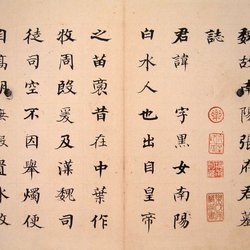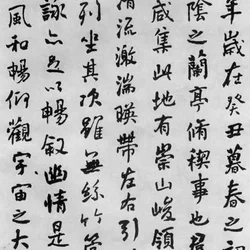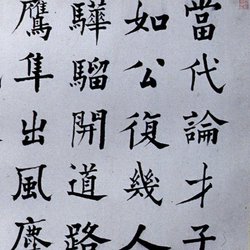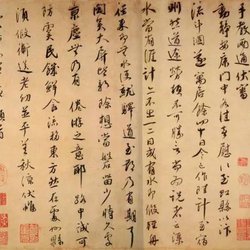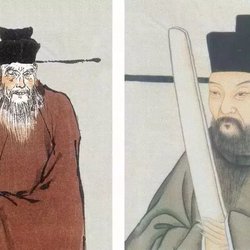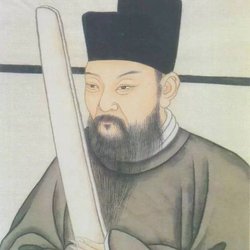Cai Xiang (1012-1067), whose courtesy name was Junmo. He was originally from Guangzhou, lived in Xianyou (now part of Fujian Province), and moved to Futian. He became a bachelor in Duanming Palace and knew Hangzhou. He was given the posthumous title Zhonghui. Gong Zheng, Xing, Cao, Li Shu, and can also fly white script. He tried to use loose brush to make cursive script, which is called "San Cao" or "Fei Cao". He studied calligraphy from Yu Shinan and Yan Zhenqing, and also from Jin Dynasty. The world ranks Cai Xiang first in running script, second in small regular script, and third in cursive script. Together with Su Shi, Huang Tingjian and Mi Fu, they are collectively known as the "Four Masters of the Song Dynasty" and are well-known in the book garden.
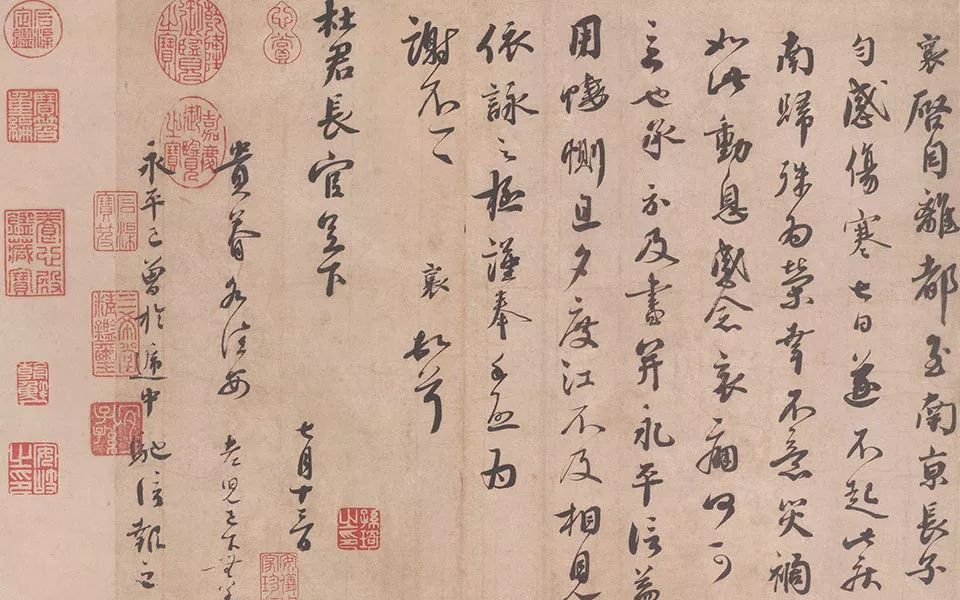
Song · Cai Xiang · Lidu Tie
"Lidu Tie", also known as "Child Slip to Chief Du Jun", is a ruler-slip, running script, on paper, 29.2cm in length and 46.8cm in width. It was written by Cai Xiang of the Northern Song Dynasty and was written in 1055. The rich and thick calligraphy of this calligraphy resembles that of Yan Zhenqing, and also has the grace of Wang Xizhi's calligraphy. Collection of the National Palace Museum, Taipei, China.
Interpretation: Xiang Qi. From Lidu to Nanjing. The eldest son suffered from typhoid fever for seven days. So I can't bear this disease. It is an honor to return to the south. Unexpectedly, the disaster is like this. Breathtaking thoughts. There is no words to express sorrow. Instructions and letters. And Yongpingxin. It is useful to express sadness. Crossing the river day and night. Not as good as meeting you. Yi Yong's extreme. I would like to express my gratitude. Not one by one. Xiang paused. Commander Du Jun steps down. July 13th. May all your noble family members be well. The old man is fine. Yongping has been delivered. Chixin reported it.
This post was written by Cai Xiang when he was about to cross the Yangtze River and "return to the south". He recalled that he left the capital (Kaifeng) and traveled to Nanjing (today's Shangqiu) and lost his eldest son. A friend wrote to express condolences, and Xiang wrote this book to express his gratitude.
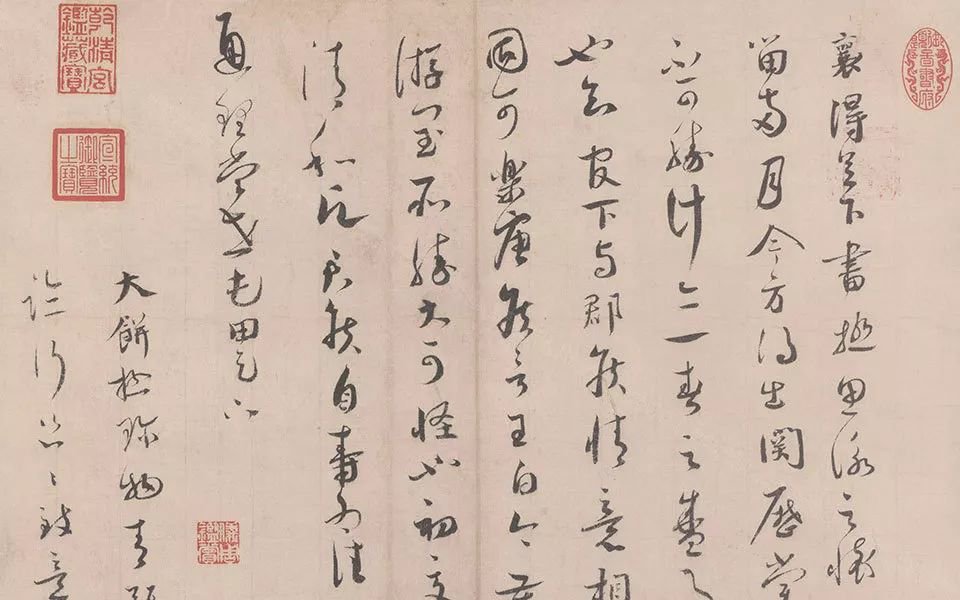
Song · Cai Xiang · Si Yongtie
"Si Yong Tie", 1051, paper, length 29.7 cm, width 39.7 cm. Collection of the National Palace Museum, Taipei.
Explanation: Xiangde wrote this letter with great thoughts and chants. After staying in Hangzhou for two months, I just came out of the customs. I was drunk after watching the drama, which is a great event of spring. It is a joy to know that the subordinates of the magistrates and the princes and princes have the same affection. Tang Hou said: It is strange that Wang Bai won by You Run this year. The scenery is peaceful in early summer, and I wish you a long life. Xiang paused. Tongli was a farmer in his time. The big cake is extremely precious, and the green pot is slightly thick. I paid my greetings in a hurry before leaving, but I didn't pay enough attention to them.
In November of the second year of Emperor Huangyou of the Song Dynasty (1050), Cai Xiang set out from Xianyou, Fujian Province. At the call of the imperial court, he took up the post of Youzhengyan and fellow practitioners. Passing through Hangzhou and staying for about two months, in the early summer of 1051, he continued north to Bianjing. Before leaving, he left a letter to his friend Feng Jing (who was living in Qiantang), which he met in Qiantang. This is the "Siong Tie".
The last two lines of "Si Yong Tie" read, "The big cake is extremely precious, and the green pot is slightly thick. I was in a hurry to say my greetings before leaving, so I didn't pay close attention to it." The "big cake" in it should refer to the tribute tea dragon group at that time; Ou, it should be a celadon tea bowl from Longquan, Zhejiang. In this etiquette exchange among tea lovers, we can also feel that in the use of tea sets, in addition to the rabbit hair cups that are necessary for tea fighting, I am afraid that more celadon is used for daily tea tasting.
"Si Yong Tie" is written in cursive script, with ten lines in total. Each word is independent and the meaning of the strokes is implicit. The writing style is lively, subtle and elegant. Although the whole article is not as long as the words "tea" and "ming", the romantic and suave characters contained in it, as well as the charm of tea games, are really vivid and lingering.
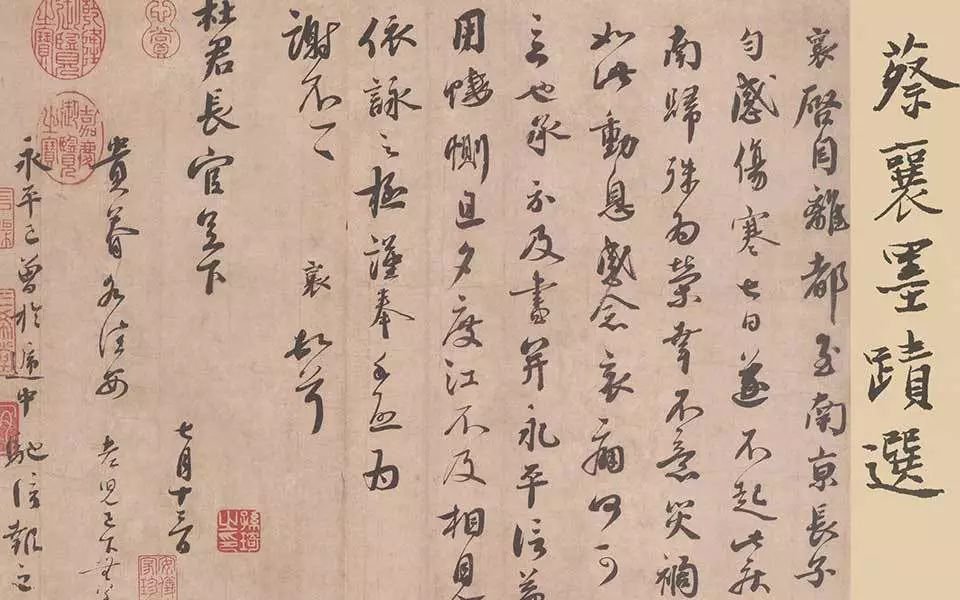
Song · Cai Xiang · Athlete’s foot post
"Athlete's Foot" ruler slip, circa 1060, running script on paper, 26.9cm x 21.7cm, collected by the National Palace Museum in Taipei.
Explanation: Since April, I have been suffering from athlete's foot and swelling, which has subsided in autumn, so I went north without hesitation, but I have not forgotten the beautiful scenery in the lakes and mountains. Sanqu was asked to read the book, but it was inconvenient, and he still answered from time to time, feeling ashamed and wary. The seal will be handed over on the fourth day of this month, and when the sun comes out, Xiang will go up again.
Most of Cai Xiang's calligraphy is in regular script, but this calligraphy is unique in that it is cursive calligraphy. Its writing style is exquisite, smooth, powerful and graceful, making it a masterpiece of Cai Xiang's cursive calligraphy.
"Beriberi Tie" is a letter, and the whole post says: "Since April, I have been suffering from swollen athlete's foot, and it is getting better in autumn, so I went north without leaving, but I have not forgotten the good news in Hushan." "The First Edition of Shiqu Baoji" recorded in " "Album of Calligraphy by Famous Masters of the Song Dynasty", and Cai Shu's "Beriberi Tie" is one of them. The original traces were published in the sixteenth volume of the Forbidden City Weekly.
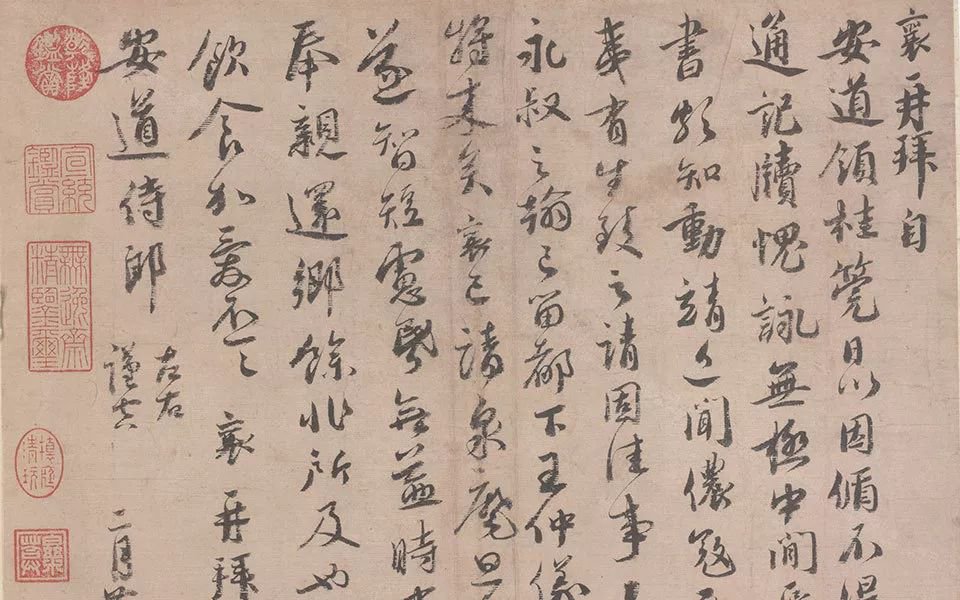
Song · Cai Xiang · An Daoti
"An Dao Tie" ruler tablet, 1055, paper, 26.8 cm in length and 35.5 cm in width, collected by the National Palace Museum in Taipei.
Explanation: Xiang worships again. Since An Dao, he has been in charge of Gui Guan, and he has been in trouble every day. He has not been able to remember the official documents at all times, and he is ashamed to chant Wuji. In the middle, he insulted the book and knew how to move Jing. I have recently heard that the Nong invaders invaded the southwestern barbarians, and I would like to send you a message, which is a good thing. Uncle Yong and Zhihan have stayed in the capital, and Wang Zhongyi is coming. Xiang has invited Quanhui, and he will do it day and night. Being short-witted and careless is of no use to current affairs, and if you return to your hometown with relatives, the rest is beyond your reach. Chunxuan, food and love, not one by one. Xiang worships again, accompanied by the minister of An Dao. Be empty. February 24th.
Cai Xiang's calligraphy was highly praised by his contemporaries during his lifetime, and he enjoyed a high reputation. The people who most highly praised his calligraphy skills were Su Dongpo and Ouyang Xiu. Su Dongpo pointed out in "Dongpo's Inscriptions and Postscripts": "Ducai Junmo has high talent, profound knowledge, good mind and hand, and endless transformation, so he is the best in this dynasty. However, running script is the best, followed by small regular script, and then cursive script... … He also tasted his thoughts and said that he had the power of flying dragons and dancing phoenixes, and those who know him would not take it as an exaggeration.”
Ouyang Xiu's evaluation of Cai Xiang's calligraphy was truly unparalleled. Ouyang Xiu said: "Since Su Zimei's death, he has felt that his calligraphy is outstanding. In recent years, Jun Mo has been alone in the world, but he has been humble and refused to lead an alliance."
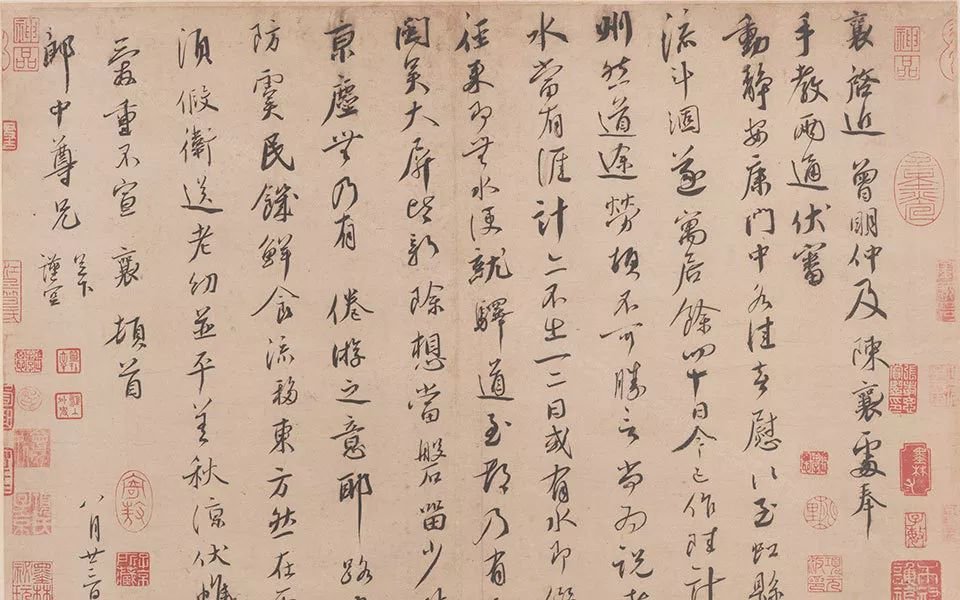
Song · Cai Xiang · Hongxian Tie
"Hongxian Tie" ruler tablet, 1051, paper, 31.3 cm in length and 42.3 cm in width, with thirteen lines of running script. Collection of the National Palace Museum, Taipei. The calligraphy is exquisite. From a calligraphy point of view, it should be written by a middle-aged person. There is Xiang's collection seal number in the lower right corner.
Explanation: Xiang Qi: Recently, Zeng Mingzhong and Chen Xiang taught Liangtong by hand, and found out the movement, quietness, and health. Everyone in the door was good, and I was happy and comforted! When I arrived in Hong County, the Bianliu River dried up, so I lived there. In the remaining forty days, we have made a land plan and reached Suzhou. However, the journey is tiring and unbearable. The speaker said: The water in the canal must have an end, and it will not last more than a day or two. If there is water, he will arrive in a canoe; if there is no water, he will take the post road and arrive in the capital in time. The large screens of Fujian and Wu were all newly removed, and I wanted to be a Panliu for a long time. After being in the dust of Beijing for a long time, there is no sense of tiredness. The road can be guarded against mosquitoes. The people are hungry and have fresh food. They move to the east. However, in the prefectures and counties, they must be escorted by fake guards, old and young, and be kind. Autumn is cool, but love is heavy, and it is not declared. Xiang paused. Lang Zhongzun, brother. Be empty. August 23, Suzhou.
This post was written when Cai Xiang was on his way back to Beijing. According to previous research, it was clearly dated to the third year of Huangyou (1051 AD). However, when we arrived in Hongxian, the Bianhe River dried up, so we could not return to Bianliang by water, so we had to take the land route via Suzhou. The so-called "Jin Kong" is a simple term used at the end of a book by people in the Tang and Song Dynasties, which means to leave a blank space for approval.
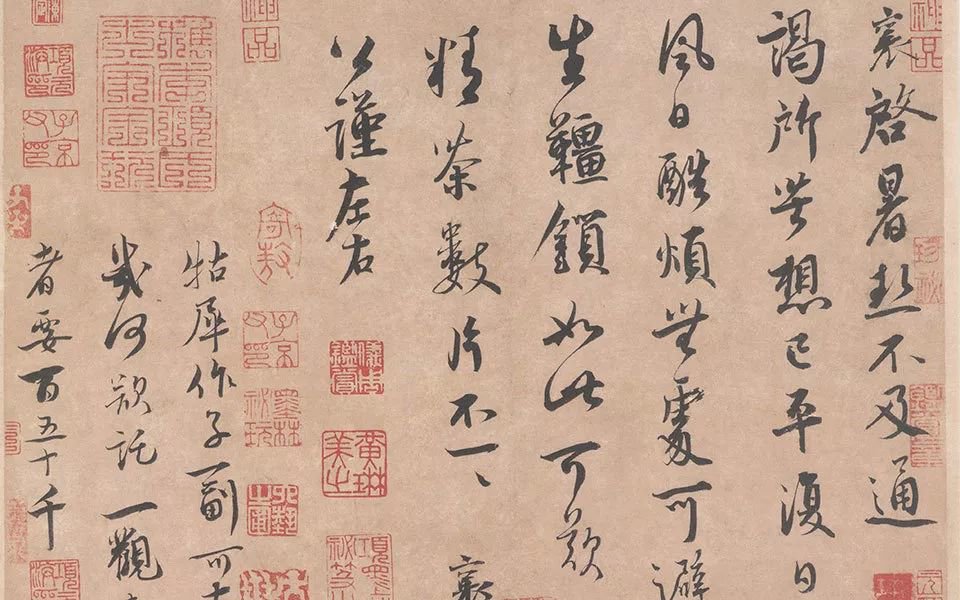
Song · Cai Xiang · Summer Hot Tie
"Shure Tie" is also called "Zhi Gongjin Ruled Slips", 1052, paper 23cm x 29.2cm, collected by the National Palace Museum in Taipei.
Explanation: Xiangqi: The summer heat is not as good as Tongye, and the painful thoughts have subsided. The sun sets, the wind blows, the weather is harsh, there is no place to escape, life is so shackles, it's so sad! There are several pieces of fine tea, not one by one. Xiang Shang, the Duke Jin is about to come. A piece of Guxi is made of a child, but if you want to see how much it is, the seller wants one hundred and fifty thousand.
"Shure Tie", also known as "Zhi Gong Jin Ruler Letter", is a cursive handwritten note written by Cai Xiang to his friend Li Duanyuan (also known as Gong Jin).
The letter said that the weather was too hot and it was too late to notify and request an audience. The troubles in my heart had been solved. The weather is hot and boring day and night, with nowhere to escape, and I feel the same about the constraints in life. I brought you a few tablets of Jingcha, so I won’t go into details. How much is a pair of chess pieces made from rhino horn worth? I want to show it to you, but the seller said it would cost one hundred and fifty thousand.

